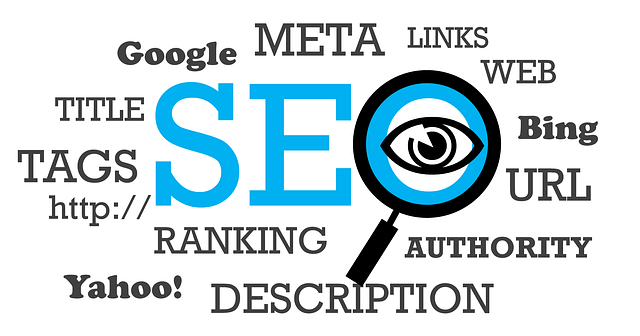On-Page SEO is a critical component of digital marketing, enhancing online visibility through strategic keyword optimization, engaging content, and user-friendly design. It includes keyword research, meta optimization, and valuable information provision. Effective on-page optimization boosts search engine rankings, drives organic traffic, and increases click rates. Off-Page SEO, focusing on backlinks, social media engagement, and reviews, strengthens online presence and credibility. Link building through guest blogging, influencer collaboration, and content creation enhances website authority. Social media platforms are essential for content distribution, brand awareness, and interaction with a global audience, also aiding SEO. Measuring success via KPIs like organic traffic growth, keyword rankings, and CTRs is vital. The future of SEO Services emphasizes user experience and creative content, with technical optimizations and AI-driven strategies becoming increasingly important.
In today’s digital landscape, successful businesses understand the significance of robust SEO services. This comprehensive guide delves into the dual aspects of on-page and off-page SEO, providing a strategic foundation for online success. We explore key components of on-page optimization, the vital role of keyword research, and effective content creation techniques. Off-page strategies, including link building and social media integration, are also dissected. By mastering these elements, businesses can enhance their online reputation and outperform competitors in search engine rankings.
Understanding On-Page SEO: The Foundation of Your Strategy

On-Page SEO is a fundamental component of any comprehensive SEO strategy. It involves optimizing individual web pages to rank higher and gain more relevant traffic in search engine results. This includes optimizing essential elements like titles, meta descriptions, headers, content, and internal links. By ensuring each page provides an excellent user experience while aligning with current search engine algorithms, businesses can lay a strong foundation for their online visibility.
Effective On-Page SEO strategies focus on delivering high-quality, relevant content that meets the needs of the target audience. This involves keyword research to understand what terms users are searching for and incorporating those keywords naturally throughout the page. It’s crucial to strike a balance between relevant content and keyword stuffing to avoid penalties from search engines. Proper On-Page SEO practices directly impact a website’s ability to attract organic traffic, improve click-through rates, and enhance overall search engine rankings.
Key Components of Effective On-Page Optimization

Effective on-page optimization is a cornerstone of any robust SEO services. It involves optimizing individual web pages to rank higher and earn more relevant traffic in search engine results. Key components include optimizing title tags and meta descriptions, ensuring keyword usage is strategic and contextually relevant throughout content, and creating high-quality, engaging content that meets user intent.
Additionally, on-page optimization considers technical aspects like page load speed, mobile responsiveness, header tag structure, and internal linking. These elements work together to enhance user experience and signal to search engines the relevance and authority of your pages. By addressing these components, you lay a strong foundation for successful SEO services.
Importance of Keyword Research in On-Page SEO

Keyword research is a fundamental and critical aspect of On-Page SEO, serving as the cornerstone for any successful digital marketing strategy. It involves identifying and understanding the terms and phrases that potential customers use when searching for products or services online. By conducting thorough keyword research, businesses can gain valuable insights into user behavior and tailor their content to meet these specific needs.
In the realm of On-Page SEO, keywords are strategically placed within web pages to enhance visibility and search rankings. This includes optimizing titles, headings, meta descriptions, and most importantly, creating high-quality content that incorporates relevant keywords naturally. Well-researched keywords ensure that a website’s content resonates with its target audience, increasing the likelihood of attracting organic traffic and ultimately driving conversions through effective SEO Services.
Mastering Content Creation for Better On-Page SEO

Mastering content creation is a critical aspect of on-page SEO, enabling businesses to optimize their websites and rank higher in search engine results. It involves crafting high-quality, relevant, and engaging content that not only meets user intent but also aligns with current search trends and algorithms. Effective content creation strategies include keyword research to identify topics that drive traffic and satisfy reader needs.
By integrating keywords naturally into headings, subheadings, meta descriptions, and throughout the body text, websites can improve their visibility and attract the right audience. Well-structured content with a logical flow of ideas also enhances user experience, encouraging visitors to spend more time on the site and reduce bounce rates. This, in turn, signals to search engines that the website is valuable, leading to better rankings for relevant SEO services.
Off-Page SEO: Building Your Online Reputation

Off-Page SEO focuses on enhancing your online reputation and visibility through external factors, which is a strategic aspect of SEO services. This involves building high-quality backlinks from authoritative websites, social media engagement, and managing online reviews. By increasing the number and quality of backlinks, you signal to search engines that your website is a trusted resource, thereby improving your search rankings.
Social media plays a significant role in this process as it allows businesses to connect with their audience directly, fostering interactions and building a positive brand image. Online reviews are also crucial; positive feedback from satisfied customers can significantly influence potential visitors’ perceptions of your brand, encouraging them to engage with your website. Effective Off-Page SEO services thus create a robust online reputation, driving organic traffic and boosting overall business visibility.
Link Building Strategies for Enhanced Off-Page SEO

Link building is a critical component of off-page SEO services, aiming to increase a website’s authority and visibility. Effective strategies involve acquiring backlinks from reputable and relevant sources. This can be achieved through guest blogging on influential websites, where content creation contributes to both link acquisition and exposure to new audiences. Additionally, reaching out to industry influencers or other websites in the same niche for collaboration opportunities can lead to valuable links.
Diverse approaches, such as creating shareable assets like infographics or conducting interviews with notable figures, can attract natural backlinks. Participatory events, both online and offline, offer platforms for interaction and potential link-sharing. Building relationships with these key players ensures a steady stream of high-quality backlinks, enhancing the overall SEO services for the website.
Social Media and Its Role in Overall SEO Performance

In today’s digital era, social media has become an indispensable tool for businesses and individuals seeking to enhance their online visibility and improve their SEO services. Platforms like Facebook, Instagram, Twitter, and LinkedIn offer vast opportunities for content distribution, engagement, and interaction with a global audience. By leveraging these platforms effectively, businesses can drive organic traffic to their websites, increase brand awareness, and build a strong online presence. Social media posts, when optimized with relevant keywords and strategic hashtags, contribute to overall SEO performance by improving search engine rankings.
Moreover, social media serves as a powerful channel for gathering user feedback, monitoring trends, and understanding customer preferences. This valuable insights can inform content creation strategies and website enhancements, further strengthening the online presence of businesses. Integrating SEO services with robust social media management allows companies to optimize their digital footprint, engage with their target audience, and ultimately achieve better search engine results.
Measuring Success: Tracking Key Metrics for SEO Services

Measuring success is a critical aspect of any digital marketing strategy, and SEO services are no exception. To gauge the effectiveness of on-page and off-page SEO efforts, it’s essential to track key performance indicators (KPIs). These metrics provide valuable insights into the visibility, traffic, and overall health of your website in search engine results pages (SERPs).
Some critical KPIs include organic traffic growth, keyword rankings, click-through rates (CTRs), bounce rates, and conversion rates. Organic traffic growth indicates how effectively your SEO strategies are attracting visitors from search engines. Keyword rankings reveal the position of your target keywords on SERPs, while CTRs and bounce rates help assess the quality and relevance of your website’s content to users. Conversion rates, on the other hand, measure the success of your SEO efforts in driving desired actions, such as leads or sales. Regularly monitoring these KPIs allows for data-driven decisions, enabling you to optimize SEO strategies and stay ahead in a competitive digital landscape.
The Future of SEO Services: Trends to Watch

The digital landscape is ever-evolving, and so too are the strategies that drive online visibility. As we look ahead, several trends in SEO Services are poised to reshape how businesses connect with their audiences. One prominent shift is the increased emphasis on user experience (UX). Search engines are prioritizing websites that offer seamless navigation, fast loading times, and mobile-friendliness, creating a more immersive and intuitive browsing experience. This trend underscores the need for SEO strategists to focus on technical optimizations, ensuring sites are structured for both search engine algorithms and end-users alike.
Additionally, content creativity is taking center stage. With search engines becoming ever more sophisticated, producing high-quality, diverse, and engaging content is vital. This includes incorporating interactive elements, multimedia, and personalized experiences tailored to individual user preferences. As AI continues its rise, natural language processing will play a significant role in understanding user intent, leading to more precise search results and content creation strategies that align with these expectations.
